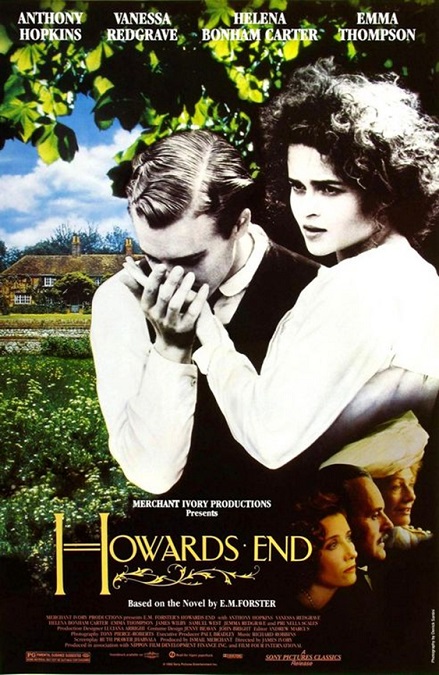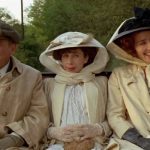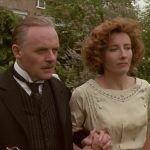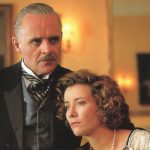
Howard’s End – 1992
“OK, round up the usual suspects. Look up the cast from Room With a View. Get on the phone to Helena Bonham Carter, Emma Thompson, Maggie Smith… Maggie’s not available? Alright, call Vanessa Redgrave. Get Anthony Hopkins and… Yeah, sure, why not? Get Simon Callow over here. Oh, and see how many of them can come back next year for Remains of the Day.” I know. That assessment is not at all a fair one. Emma Thompson wasn’t even in Room With a View. But it isn’t very far from the truth.
This is another one of those slow and dull British Merchant-Ivory period dramas. It dealt with, you guessed it, issues of class, social propriety, mixed in with a bit of romance. Was it a bad film? Of course not. It was well-made and had some pretty spot-on acting. The sets and costumes were elegant and the overall aesthetic was pleasant and somewhat nostalgic. But if you look at other films like Room With a View, Maurice, and Remains of the Day, and you get the same actors playing the same kinds of parts, dealing with the same kinds of issues. The movie itself wasn’t dull. The genre is.
I think it is because of my American sensibility. Class isn’t as much of an issue here in the United States. In England, it seems to be everything. Otherwise, why do they spend so much time focusing on it? But it is also because period pieces, while quaint, are pretty far removed from my modern sensibility. Some of the issues and complications these films have would not work in a modern movie.
The story revolved around three families, each representing a different social class. The Schlegel family, which consists of three siblings: Margaret, the eldest, played by Emma Thompson, Helen, the youngest, played by Helena Bonham Carter, and Tibby, played by Adrien Ross Magenty. They represent the enlightened bourgeoisie who find it fashionable to care about the poor. Then there are the Wilcoxes, representing the wealthy capitalists who are slowly replacing the aristocracy, made up of Ruth and Henry, played by Vanessa Redgrave and Anthony Hopkins, and their three children, Charles, Paul, and Evie, played by James Wilby, Joseph Bennett, and Jemma Redgrave. There was also Dolly Wilcox, Charles’ wife, played by Susie Lindeman. Then there are the Basts, Leonard and Jacky, played by Samuel West and Nicola Duffett, who represent the lower-middle class, and who become the unwitting targets of Helen Schlegel’s crusade to help the poor.
Yes, there are a lot of characters, but I didn’t find it too hard to keep them all separated. The plot offered few little romance stories, but not the ones you think you are going to see. So along with the talented cast, that kept things interesting. But I think some of the film’s biggest drama was supposed to be things like the rift that formed between Margaret and Helen because Margaret decides to marry the widowed Henry Wilcox. How dare you marry a rich man when he has such a horribly dismissive attitude toward the poor? Or Henry’s admission that he’d once had an extramarital affair with Jacky Bast before she’d been married, though Margaret forgave him immediately, without judging him.
You know, I think that’s the problem I had with the movie. The drama just wasn’t that deep, or wasn’t handled in a very serious manner. The plot seemed very episodic and when there was a conflict, it was generally solved pretty quickly. The movie covered a span of years, following the ins, outs, and interactions between the families, but didn’t really go very far in terms of action. Even when Helen returns home pregnant and unwed, and it is revealed that Mr. Bast is the father, the issue is quickly resolved. Paul Wilcox goes into a rage and accidentally kills him. He is arrested and goes to jail fort murder, an interesting sequence that could have lasted fifteen or twenty minutes. But the whole sub-plot takes up about eight minutes of the two and a half hour movie.
The music was nice, but not very original. The only original music, composed by Richard Robbins, was used for the opening titles and the closing credits. Everything else was well-known classical pieces, mostly piano music. I suppose it was appropriate for the film, but not terribly original. And the underscoring, while good, was either soft, slow, introspective, and romantic, or more cheerful and jaunty than it seemed it should have been, which had the effect of lightning the mood of dramatic moments that could otherwise have made the film more gripping.
But in doing my research, I found that the fates of the three families were a metaphor for the changing class system in England. In fact, I think Wikipedia found a great way of saying it which I will quote here. “In both the film and the novel, the final ownership of Howards End is emblematic of new class relations in Britain. It is the wealth of the new industrialists (the Wilcoxes), married to the politically reforming vision of liberalism (the Schlegels,) which will make amends and reward the children of the underprivileged (the Basts); whereupon Howards End is revealed as an instrument of poetic justice and redemption.” Nicely put.








